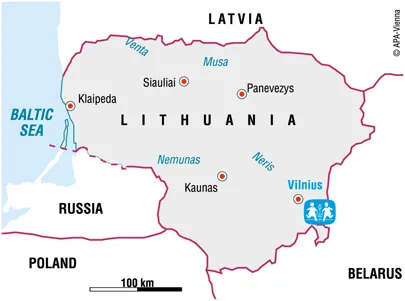SOS Children's Villages first started working in Lithuania in 1991, after the country gained independence from the former USSR. SOS Children's Villages has responded to the changing needs of children, young people and families in Lithuania, adapting its work in order to support children at risk. At present there is one SOS Children's Village, one SOS Youth Facility, three SOS Social Centres (thereof one SOS Holiday Camp, one family strengthening and one day care centre).
Some facts about Lithuania
The Republic of Lithuania is the southernmost largest Baltic state with a population of 3.5 million. It has borders with Latvia in the north, Belarus in the east and south-east, Poland and Kaliningrad (a Russian enclave) in the south-west and the Baltic Sea in the west. The capital city of Vilnius has a population of around half a million. Most of the population is Lithuanian but six per cent are Polish (living mostly in the Vilnius area) and five per cent are Russian.
In 1991 Lithuania became a sovereign country, having declared itself independent from the former USSR.

At present SOS Children's Villages works in two locations in Lithuania. The more permanent programmes are based near the capital city of Vilnius. In addition to providing family-based care, SOS Children's Villages also provides day-care facilities for young children, accommodation for young adults and a family-strengthening programme. The latter is particularly important in helping local families to look after their children in their own homes – they work with families, communities and other agencies to ensure that children are provided with a caring family environment.
Lithuania's economy is slowly recovering from the crisis
In the four years prior to joining the European Union in the spring of 2004, Lithuania's economy grew an average of eight per cent a year. However, Lithuania's economy suffered badly from the global economic crisis, and the gross domestic product fell by nearly 15 per cent in 2009. Unemployment increased in this time and currently stands at around 18 per cent (2010 est.). Most of the population works in the services, nearly a third works in industry and 14 per cent works in agriculture producing grain, potatoes and vegetables. The situation is particularly precarious for people living in rural areas, who are most at risk of living in poverty.
Lithuania has a variety of social problems to address. Organised crime and corruption continue to be a problem. Although violent crime has decreased in recent years, Lithuania still has one of the highest homicide rates in the European Union.
The provision of health care has improved since 1991, but there are still regional differences. Lithuania has got one of the lowest life expectancy rates within the European Union. Since becoming independent from the former USSR, Lithuania has had one of the highest suicide rates in the world.
Many Lithuanians have emigrated in search of a higher standard of living. According to national statistics, the population of Lithuania has fallen by about 180,000 since it joined the EU in 2004. The emigration of parents means that children are often placed in care institutions.
Situation of the children in Lithuania
Children under the age of 14 account for 13.8 per cent of the population of Lithuania. The recent social, economic and political changes have worsened the situation for children in the country. The violence found in Lithuanian society at large also affects children - children are often taken into care due to physical abuse. Unemployment and poverty have also forced some parents to place their children in care. Alcohol abuse is a real problem in Lithuania, particularly in rural areas.
According to official Lithuanian statistics, 1.7% of all children in Lithuania are in care. The majority of children without parental care find themselves in state-run care establishments, where the conditions are not ideal – the infrastructure is old and there is a lack of qualified specialists who can care for the children.
Children in rural areas are particularly disadvantaged – there is a shortage of educational facilities, there is worse access to health care than in the cities and less support for families who need help.
Our Impact
Image
The SOS Children's Village in Lithuania provides loving homes to orphaned and abandoned children |
1 VILLAGES | 60 Orphaned and Abandoned Children |
Image
The SOS Youth Facilities in Lithuania provides youth with a loving environment where they learn to transition into independent living and to expand their education |
1 YOUTH FACILITIES | 26 Youths in our Care |
Image

SOS Social Centres in Lithuania aim is to help families, in particular women and children, living in communities neighbouring the SOS Children's Villages to gradually escape from poverty, and to help young people become self-reliant. |
2 SOCIAL CENTRES | 943 Beneficiaries |
Our Impact





